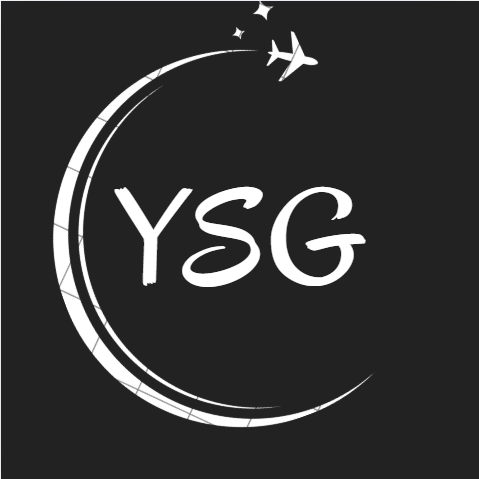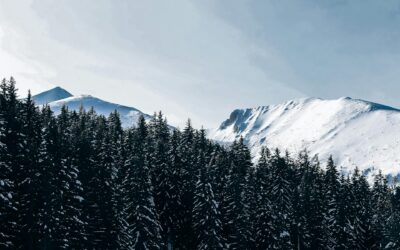Bulgaria Travel Guide
Bulgaria Travel Tips: The Best Guide to Exploring BulgariaThis article may contain affiliate links and at no additional cost to you, we earn a commission if you make a purchase. Also, as an Amazon Associate, we earn from qualifying purchases. For full information, please see our disclaimer.
Welcome to Bulgaria, a fascinating blend of ancient history, rich culture, and breathtaking natural beauty. This Eastern European gem remains one of the continent’s most underrated travel destinations. From the Black Sea’s sun-soaked beaches to the Rila Mountains’ snow-capped peaks, Bulgaria offers a proper adventure for every kind of traveler. As a local, I’ve created this ultimate Bulgaria travel guide to help you plan the trip of a lifetime, filled with various tips and experiences that will keep you excited throughout your journey!
Bulgaria Travel Guide: Quick Information
Whether you wander through the streets of Plovdiv, Europe’s oldest continuously inhabited city, admire the majestic beauty of Rila Monastery, or taste local wines in the Thracian Valley, Bulgaria promises an unforgettable journey. Its rich history, mouthwatering cuisine, and welcoming locals (me as well 🙂 ) make it an affordable and authentic destination. Founded in the 7th century, Bulgaria is one of the oldest countries in Europe.
What to know before traveling to Bulgaria? In this comprehensive Bulgaria travel guide, I’ll take you through everything you need to know – from must-see destinations and hidden gems to practical tips on where to stay, what to eat, and how to get around. Bulgaria has something for everyone, whether planning a cultural city break or an outdoor adventure. Here you could have an unforgettable experience every season of the year. Let’s dive into the best of Bulgaria, my homeland, and plan your trip with the help of this Bulgaria travel guide.
The Capital of Bulgaria – Sofia
Sofia is Bulgaria’s capital and the most important city in the West Region, surrounded by the Vitosha and Lulin mountains. If you want to find the main sights, look at the best places to visit in Sofia. A walking tour of Sofia will provide beautiful sightseeing points when you get to the city center. You will have the opportunity to feel the hustle and bustle of the city. Go to Vitosha mountain and admire nature’s beauty if you want a short break in nature.
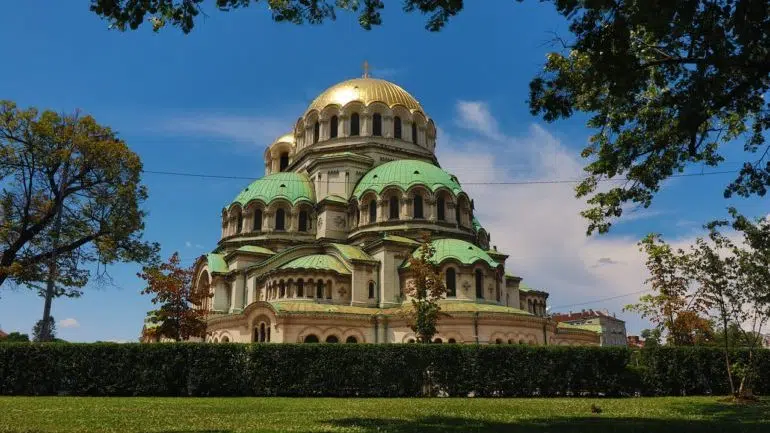
Language – Bulgarian
Yes, that’s right! We speak the Slavic language – Bulgarian. For many travelers, the Cyrillic script can initially seem intimidating. Still, with some preparation, you’ll find it easier to navigate signs and basic communication. In tourist areas, especially in larger cities like Sofia, Varna, Burgas, and Plovdiv, you’ll find that many locals speak English, especially younger Bulgarians and those working in hospitality. English speakers may be less common in rural areas or smaller towns.
Non-Verbal Communication
An interesting fact in Bulgarian non-verbal communication is the opposite head gestures for “yes” and “no.” In Bulgaria, shaking your head from side to side means “yes,” while nodding up and down means “no.” It can be confusing at first, so it’s good to be aware of this unique cultural difference.
Religion in Bulgaria – Christianity
The main religion in Bulgaria is Eastern Orthodox Christianity, which was adopted as a state religion in 865.
Currency – Bulgarian Lev
Still Bulgarian lev (BGN) => 1.95583 for 1 EUR. ATMs are widely available, and credit cards are accepted in most hotels, restaurants, and shops. Still, smaller guesthouses or rural businesses may only accept cash. So, in general, it’s a good idea to keep a small amount of local cash with you.
Electricity Socket
The electricity is 230V AC, and the power outlets are usually from type F. You can use your electric stuff in Bulgaria if the standard voltage in your country is 220 – 240V (in the UK, Europe, Australia, most of Asia, and Africa). But if it is in the range of 100 – 127V (the US, Canada, and most South American countries), you need a power plug adapter/voltage converter.
Bulgarian Visa
Foreigners may enter Bulgaria with a regular foreign travel document, another equivalent document, and a visa if required. If you hold a Schengen visa, a visa-free regime applies. You will have the right to enter and reside in Bulgaria for no more than three months in any six months from the first entry date. US and Canadian citizens may stay in Bulgaria by the same rules. Other nationalities need a Schengen visa to travel to the country. If your stay exceeds 90 days, you must apply for a residency permit. You can find more information on the Ministry of Foreign Affairs page.
History of Bulgaria
Bulgaria’s history had its roots a hundred years ago. It traces back to 632 when the Bulgars, under the leadership of Khan Kubrat, established a state north of the Black Sea – Great Bulgaria. Pressure from the Khazars led one of Kubrat’s heirs, Asparukh, to migrate with some of the Bulgar tribes to the Danube Delta area. They conquered territories from the Byzantine Empire, and after the peace in 681, they founded the First Bulgarian Empire. The First Bulgarian Empire collapsed under Byzantine attacks in the 11th century and became part of the Byzantine Empire.
In 1185, a major uprising led by the brothers Asen and Peter restored the Bulgarian state and formed the Second Bulgarian Empire. From 1396, Bulgaria remained part of the Ottoman Empire for the next 482 years. In the 19th century, the April uprising and the Russo-Turkish War 1877–78 led to Bulgaria’s Liberation. Bulgaria became a member of NATO in 2004 and of the European Union in 2007. Maybe it will be interesting for you also to find out what it was like on the eastern side of the Iron Curtain in Sofia by joining this Communist tour.
Safety and Insurance
You may ask – Is Bulgaria friendly to tourists? Yes, it definitely is. I am sure you will feel great in my homeland and could have a great experience here. And yes, most locals are very friendly to tourists.
Let’s now check some travel tips regarding safety in Bulgaria. There are some scams here (as everywhere else), but Bulgaria is generally safe. As a tourist, you should be careful with your personal belongings, especially in hotspots such as Sofia or sea and mountain resorts (Sunny Beach, Bansko), so you can avoid pick-pocketing, which is actually rare in Bulgaria. Be cautious in the nightlife areas to prevent violence and stay safe. As a tourist, be careful with the fake taxis in Bulgaria, especially in Sofia and the big cities. Their cars are similar to the official ones (with slight differences in the telephone number or name), but their prices are higher. An online taxi booking application is a better option (for example, for Sofia – Yellow Taxi, TaxiMe, Varna – Triumf Taxi). Just be careful. And, of course, don’t travel without insurance.
Bulgaria Travel Guide: Trip Planning
Weather in Bulgaria
You can visit Bulgaria all year round, and you won’t regret it. Bulgaria’s climate is continental, with cold winters and warm to hot summers. It is milder along the Black Sea coast and colder in hills and mountains.
The best time to explore the country is Spring or Autumn. If you want to spend your summer holiday in Bulgaria, that will be the right decision. Choose the high season from June to August for the sunniest and hottest days (30*C with rare peaks of 40*C). So, you can spend the whole vacation on the beach, where the breeze will cool the heat. In winter, go to the most famous mountain resorts like Bansko, Borovets, and Pamporovo, and go skiing in the beautiful nature.
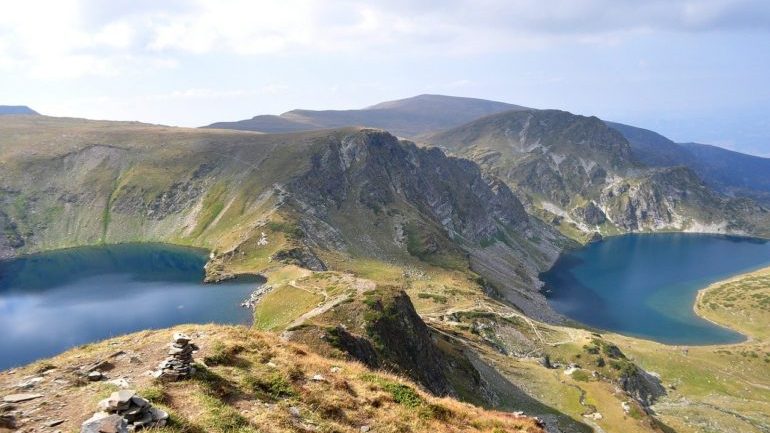
Transport in Bulgaria
There are plenty of options for direct flights to Bulgaria, especially from airports within or close to Europe. The airports are in the biggest cities – Sofia, Varna, Burgas, and Plovdiv. Traveling from one place to the next is relatively easy in Bulgaria. You can use public transport to travel more cheaply – buses or trains. Buses play a significant role in long-distance public transport. They are usually faster than the state railways (BDZ) but are a bit more expensive. If you prefer your own kind of transportation, renting a car can be the best choice and help you discover every part of my lovely country.
Budget for a Trip to Bulgaria
It depends on you and your wishes. You can spend your holiday around for as cheap or as expensive as you want. My experience shows you can travel to Bulgaria for about 50-80 EUR daily. These costs include accommodation, food, and activities, being your most considerable expenses. But you can do this much cheaper if you are on a budget. Hotels are less expensive than in many European countries, and you also have some hostel options in the bigger cities.
Food is also not so expensive. For example, breakfast prices are usually cheaper than lunch or dinner. If you eat local street food, you can get a banichka (read more about the local food in Bulgaria below) for a euro or a portion of kebapcheta for about 2 EUR. Restaurants are generally cheap, but eating there is more expensive, with about 5 – 10 EUR for a single dish.
Entertainment costs, such as tickets for museums and attractions and other sightseeing expenses, are around 10 – 15 EUR per person daily. Regarding transportation in the cities, the bus is the most common option. The city bus ticket is around 0.80 – 1 EUR and the daily ticket is 2 EUR (Sofia).
What to Pack for Traveling to Bulgaria
Traveling to Bulgaria is generally easy, except for a few colder months (November – March). Some of my travel tips to Bulgaria are to bring warm clothes with you in winter – a pullover, a jacket, a hat, gloves, and a scarf. Take boots and a thick coat in winter or if you want to go to the countryside. In summer, bring sandals, light clothes, a T-shirt, short pants, a light jacket and a sweatshirt for the evening. For every season – cold or hot – the sun shines, and you don’t want to go on outdoor activities without sunglasses.
As a quick overview, here are some of my must-bring items while traveling:
– a portable water filter bottle;
– a sand-free beach blanket;
– a good pair of travel shoes for my journey.
In addition, having a light power bank with you might be a good idea, especially if you take a lot of photos for your Instagram. Be sure to pack some food and water if you go out of the cities, too.
Bulgaria Travel Guide: The Best Things to Do
What is Bulgaria Famous For?
Bulgaria has a little bit of everything for everyone. Touring the towns on foot will provide stunning views, from the Black Sea’s dramatic cliff-edge views to lush green valleys with ancient ruins and natural landmarks. Excluding the bigger cities such as Sofia, Plovdiv, Varna, and Burgas, you can easily explore the others by walking and feeling the local atmosphere. And don’t forget to take lots of photos – to show them to your friends who can’t travel to Bulgaria or just to make them jealous.
Below are my recommendations on the best things to do in Bulgaria.
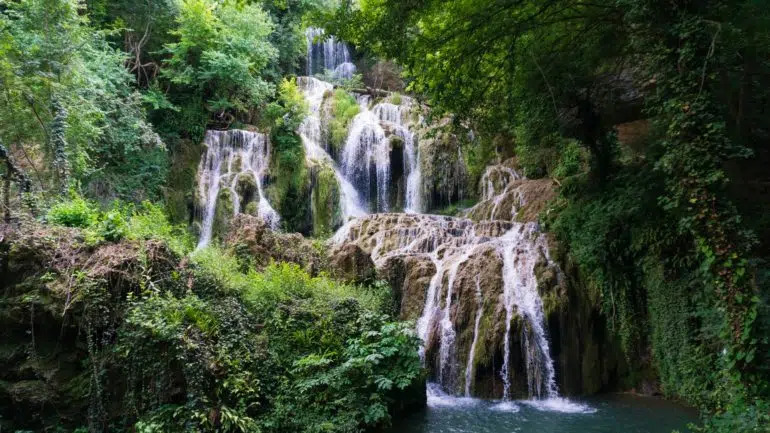
“Ever Growing, Never Aging” – Sofia
Sofia, Bulgaria’s capital, is an amazing old city. It has temples, ancient buildings, museums, shopping areas, restaurants, and attractions for everyone, bringing different cultures into the city. Sofia is the biggest city in Bulgaria, so you can hardly explore it in a day. Using the subway to get from place to place is the best option because of traffic jams and the city’s inconvenience for cycling.
When you get to the city center, a walking tour will provide you with wonderful sightseeing points and allow you to experience the hustle and bustle of the city.
Visit the Patriarchal Cathedral of St. Alexander Nevski – the largest Orthodox temple on the Balkan Peninsula. Or the oldest temple in Bulgaria, dating back to the 4th century – Saint Sophia Church. Inside one of Sofia’s landmarks, reconstructed many times – the medieval church of St. Nedelya, you can see colorful murals and wooden iconostasis.
Go for a walk on Vitosha Boulevard – the main commercial street in the center of Sofia, full of stores, restaurants, and bars. Stop for a break and sit on a bench in front of the largest multifunctional conference and exhibition center in south-eastern Europe – the National Palace of Culture. Do you want a short break in nature? Go to Vitosha mountain and walk to the most familiar points – the peak Cherni Vrah, the areas Zlatnite Mostove, and Kopitoto.
Explore the Rest of Bulgaria
In this Bulgaria travel guide, I want to mention that Bulgaria has a bit of everything. After exploring Sofia, continue your trip to the cities in the rest of Bulgaria. Get the most out of the beaches in Eastern Bulgaria and indulge in a few days of relaxing and swimming in the sea. If you prefer historical places, don’t miss some of the finest examples of ancient cities – Plovdiv and Veliko Tarnovo. Fancy seafood? Try the most delicious dishes in the fishing villages of eastern Bulgaria – Nesebar, Sozopol, while enjoying the beautiful sea views. What about a drink and a little party at night? The party center of Bulgaria – Sunny Beach – is here for you.
Famous Places in Bulgaria
Below in this travel guide to Bulgaria
are some of my favorite places in Bulgaria that I recommend you visit:
Plovdiv – Europe’s 2019 Capital of Culture. A stroll through its old town, famous for its houses from the National Revival era, is a journey back in time. The Ethnographic Museum and the Roman Amphitheatre of Philipoppol, still used for concerts and theatrical performances, offer a glimpse into the city’s rich past.
Veliko Tarnovo – Discover the medieval Veliko Tarnovo and the impressive Tsarevets Fortress, formerly the city citadel. Walk up to this fort, home to the tsars, a dozen churches, and the royal palace. If you have a chance, admire the Sound and Light show, which presents the history of Bulgaria (usually on national holidays).
Rila Monastery – Explore the spectacular UNESCO World Heritage Site located in a lovely mountain valley. It is an important religious and cultural center for Bulgarians. It was founded in the 10th century and preserved Bulgarian culture during the time. It is one of the most visited sites in Bulgaria, not only by Bulgarians but also by foreigners.
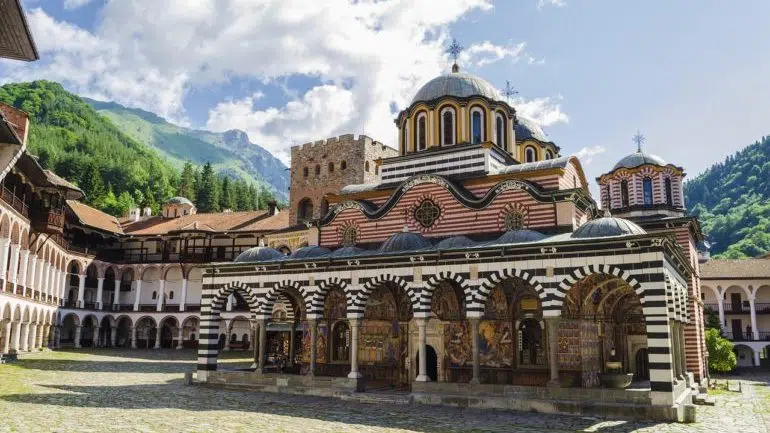
The Bulgarian Black Sea Coast
Another favorite part of the country is our east coast. The Balkan Mountains cross the country, reaching the Black Sea at Cape Emine. The Bulgarian Black Sea Coast covers the eastern border of Bulgaria (378 km). The region is an important tourism center during the summer season. Varna and Burgas are the two biggest and main cities on the Black Sea Coast. Some parts of the northern Black Sea Coast have rocky hills and cliffs up to 70 meters high. But you will find wide sandy beaches in the southern part of the coast.
The Unesco-listed Nessebar is a town worth exploring. Most of the remains here are from the Hellenistic period. You can see these of the Temple of Apollo, Acropolis, and the old city walls. There are also ruins of a Byzantine fortress and colorful 19th-century wooden houses.
Near here is Bulgaria’s party center, Sunny Beach. It is your area if you want a modern atmosphere, luxury hotels, and entertainment venues. Sunny Beach is famous mainly among couples and groups of travelers looking for entertainment, good food, and nightlife as a vital part of their holiday. It is a lively hotspot!
Less Famous Places in Bulgaria You Would Love
While popular destinations like Sofia and Plovdiv have their own magic, Bulgaria’s lesser-known places offer different charm. These hidden gems promise breathtaking views, impressive natural attractions, and rich historical sites, making them a must-visit for the adventurous traveler. I have noted some of them in this Bulgaria travel guide below. For example:
Belogradchik – The Belogradchik Rocks are a natural wonder near Belogradchik in northwest Bulgaria. The rocks vary in color and reach 200 meters in height around the town’s ancient fortress. While you’re in Belogradchik, take a trip to Magura Cave, and you can see preserved rock paintings dating back to prehistoric times. You can also book a hot-air balloon flight over Belogradchik Rocks and admire this natural beauty.
Koprivshtitsa – Koprivshtitsa isn’t trendy among tourists, especially foreigners, but it is worth visiting. The town, located in the Sredna Gora mountain, was founded in the 14th century. It gained importance later as one of the centers of the uprising against the Ottoman Empire (April 1876). Koprivshtitsa is known for its beautiful 19th-century Bulgarian Revival Architecture and is a lovely place to walk.
Balchik – Balchik is a small beach town on the Black Sea coast and a popular resort located in the country’s northeastern part, around 40 km from Varna. Balchik is a tiny Bulgarian town with plenty of things to do. One of the most visited places is Balchik Palace, built in 1926 to accommodate Queen Marie of Romania. There is a beautiful Botanical Garden right next to the palace.
Melnik – Melnik is Bulgaria’s smallest town, known for its beautiful historical houses, Bulgaria’s number one wine, and unique rock formations (Melnik pyramids created by erosion). If you are a red wine lover, there are several wine cellars where you can go and taste the fantastic Melnik wine. Check out some exciting offers for a wine tour here.
Black Sea – Explore the Underwater World
Do you know that Bulgaria is an incredible diving spot? Known for its diverse and rich underwater marine life, Bulgaria is a great place to learn scuba diving. Get PADI certified as you go diving. If you are an underwater enthusiast and want to experience some of Bulgaria’s best scuba diving sites, take day trips around. The best time to do that is from March to October.
You can see hundreds of stone trunks between the northern part of Sozopol and St. Ivan Island – the underwater Stone Forest, at a depth between 18-20 meters. You can also explore some of the sunken ships near Sozopol: the French Cargo Steamship “Jacques Fresine,” the Bulgarian Ship “Rodina,” the American Ship “Mopang,” the Turkish “Safak,” and the Romanian “Peles.”
Around 40km north of Varna, you can find one of the exciting diving points – the ancient Roman port city submerged in 12m of water. At Varna Bay is another exciting diving point – the WWII German Black Sea Fleet wreck. You can dive around 100 ships and boats along with Russian submarines.
Go Hiking and Camping in Bulgaria
Are you an adventurous person? Go hiking in Bulgaria. The Seven Rila Lakes (part of the Rila National Park) offer breathtaking views. Nestled in the northwestern part of the Rila Mountains, each glacial lake is a unique marvel, named after its shape or distinctive feature – The Eye, The Tear, The Lower Lake, The Kidney, The Fish Lake, The Twin, and The Trefoil. Hike to the mountain ridge to enjoy panoramic views of all seven lakes.
Malyovitsa is one of the most symbolic peaks in the Rila Mountains and a great hiking location. When you start hiking, you will see the majestic peak in front of you. In addition, there are some terraces with vast panoramas where you can take a break and admire nature’s beauty.
Vihren Peak is another trail near Bansko (Blagoevgrad, Bulgaria) for hiking and bird watching.
Bezbog is one of my favorite locations. It is a 12.9 km trail near Bansko (Blagoevgrad, Bulgaria) for hiking and nature trips. If you want breathtaking views, head to Pirin Mountain and its Bezbog Peak and Bezbog Lake. The whole area around it is fantastic, isn’t it?
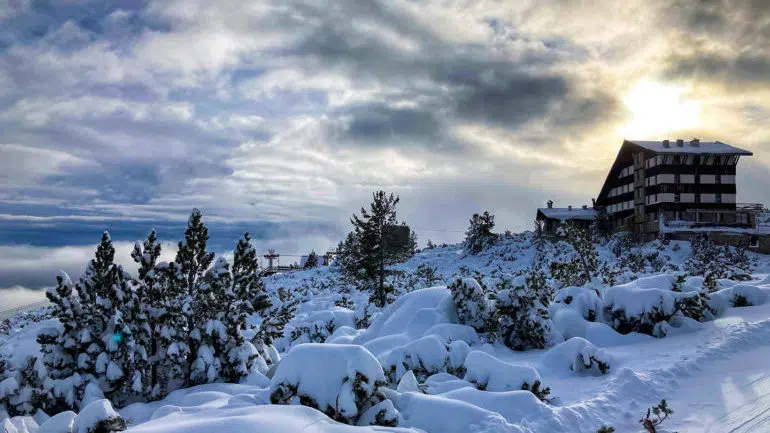
Find the Best Beaches in Bulgaria
In this Bulgaria travel guide, I should also mention that our small country offers many beautiful beaches with crystal waters worth visiting. Which one will you head to first?
You should have heard about Sunny Beach, the summer party center on the Bulgarian Black Sea coast. Many European tourists visit this famous resort every year, which is full of luxury hotels and attractions. There are various nightclubs for wild party nights, and you can choose between beach bars and all kinds of water sports during the day.
Close to Sozopol, Smokinya and Gradina Beach are favorite summer spots for young people, families, and camping lovers. They offer calm, shallow water and beach bars for a lovely daily beach experience.
Near the small town of Kavarna, you will find Bolata – a stunning beach on the Bulgarian Black Sea coast. Together with Bolata Bay, the beach is part of a nature reserve.
Irakli is another popular wild camping spot on the Bulgarian coast. It has a long sandy beach surrounded by thick forest.
Silistar is a stunning beach in south Bulgaria, covered in golden sand and with calm, warm water.
Oh, there are so many beautiful beaches in Bulgaria, but the summer is so short.
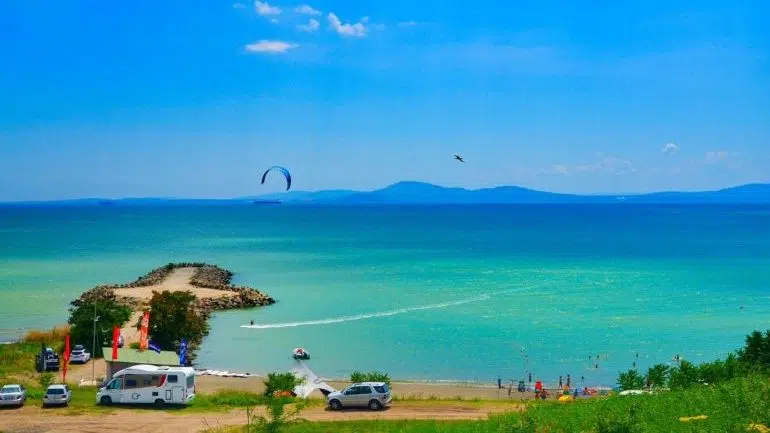
SPA Resorts in Bulgaria
Bulgaria, one of the most beautiful countries in Eastern Europe, also has some of the best spa resorts in the Balkans. Combine your trip to the country with some spa procedures and indulge yourself for a couple of days. Find more information on why my country, Bulgaria, is a top choice for a spa holiday and where to find the best spa resorts in Bulgaria.
Tours Around Bulgaria
If traveling by yourself isn’t your thing, check out the various tours offered across Bulgaria, with details and dates for each trip. You will definitely find something for you.
Bulgaria Travel Guide: What to Eat in Bulgaria
Traditional Bulgarian Dishes
What food is Bulgaria known for? Eating in Bulgaria is a rich experience inspired by local produce. The flavors are similar to those of neighboring countries, and traditional recipes have been passed down through the generations. Local Bulgarian food is something you need to try.
If you prefer beef and pork, you can find them in the most famous Bulgarian recipes. But, of course, vegans and vegetarians won’t stay hungry, too. And not to forget – the Bulgarians know how to prepare tasty pastries and sweets. Yummy! Check this food tour and explore Sofia’s most notable markets with a local guide. Learn about Sofia’s history and try traditional dishes.
In my article here you can find more information about the traditional Bulgarian dishes for Christmas. And if you want, you can prepare some of them – here are recipes for 10 traditional Bulgarian Christmas Eve dishes.

Famous Bulgarian Dishes
In this travel guide to Bulgaria, you will find the most famous Bulgarian dishes you should try, each offering a unique and delightful culinary experience.
Banitsa – Let’s begin with the famous piece of fatty pastry that you can find in bakeries all over the country – banitsa. This savory pastry, with its flaky layers and rich filling, is a delight for the taste buds. There are varieties with a filling of feta cheese, onions, cabbage, spinach, mushrooms, apples, or pumpkin, each offering a unique flavor profile. Enjoy a truly local experience with boza (the thick fermented wheat drink) or airyan (whipped yogurt).
Shopska salad – Bulgaria’s internationally known Shopska salad is a simple salad of diced tomatoes, cucumbers, onions, and peppers topped with grated white cheese and parsley. Shopska salad with a glass of rakia is the perfect start to a Bulgarian dinner.
Musaka – This dish is popular in many variations throughout the Balkan region. Yes, this is the Musaka. The Bulgarian version includes potatoes, eggs, vegetables, and minced pork meat, traditionally covered with thick Bulgarian yogurt on top.
Shkembe chorba – Shkembe chorba is a tripe soup, rich spiced, and mainly consumed by men. You have to add vinegar, oil, salt, and crude pepper to taste. It is famous as a hangover remedy, often consumed by companies after a party night.
Kiselo mlyako – Kiselo mlyako is a kind of yogurt, thick, with a sour taste, and usually served alongside classic Bulgarian dishes, desserts, or in the form of airyan.
Bulgarian wines – Our wines are also something you should taste. Choose the right taste for you and enjoy the evening with a glass of good wine. If you are interested in our local wine production, find out more about it in my blog post regarding Bulgarian wines and wineries. It’s a journey of taste and discovery you don’t want to miss. Book this wine tour and taste 5 wine varieties of local grapes unique to Bulgaria during a tasting in the heart of Sofia.
Rakia – And do not forget our famous drink – rakia. We use grapes, plums, berries, and more to make this fruity drink. At stores, you can find it with an alcohol volume percentage of around 40% – homemade even more. During the winter, try it “cooked” – heated and sweetened with honey or sugar, with added spices like black pepper. I love it with grilled Slanina (grilled pork fat bacon) and fresh bread! Tasty!

Recommended Food Tours
If you’re a big foodie like me, I recommend going on a food or wine tour during your trip. These tours, which can be booked through local tour operators or your hotel, often include visits to local markets, wineries, and traditional restaurants. The local insight of the guides is fantastic, giving you a better understanding of Bulgarian cuisine.
Bulgaria Travel Guide: Places to Stay in Bulgaria
The accommodation options in Bulgaria are numerous and varied. There are plenty of hotels of varying categories: farmhouses, villas, self-catering apartments, or guesthouses. Each option offers a unique experience, from a hotel’s luxury to a farmhouse’s charm. During the summer high season in Bulgaria, from June to September, and in winter in the ski resorts, accommodation prices can be significantly higher. It’s advisable to book in advance to secure the best deals.
Bulgaria Travel Guide: Festivals and Celebrations
Bulgaria is a country full of feasts and events during the year. Therefore, planning a trip around certain celebrations and festivals could be a great experience. So, let’s choose a suitable event for you.
At the beginning of the year, visit the famous festival in Pernik – Surva – the International Festival of the Masquerade Games. People from the whole country and foreigners dress up as monsters with scary masks and participate in ritual games to banish the evils out of the town. In my article you can learn more about the Surva Festival and Kukers in Bulgaria.
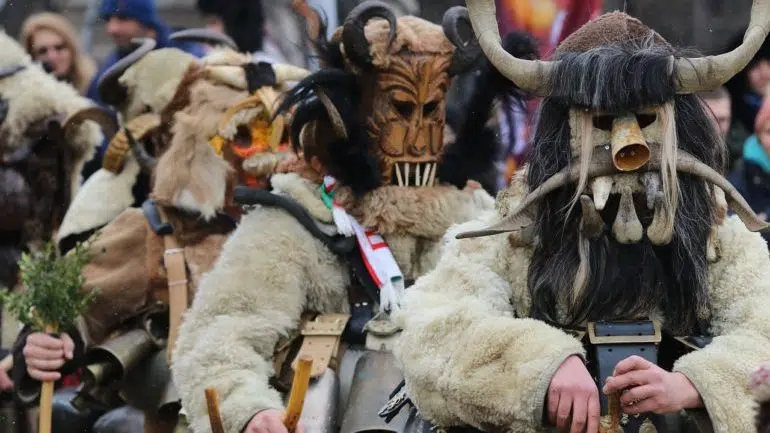
In June, you can visit the fascinating firewalking ritual in Bulgari, Burgas – Nestinarstvo. Since 2009, the tradition has been listed as a UNESCO World Heritage legacy of non-material culture.
Do you love flowers? The Rose Festival is something for you and one of Bulgaria’s symbols, with the first edition in 1903. Every year, during the rose harvest in June, thousands of visitors visit Kazanlak to witness this spectacular event.
Are you a Jazz Fan? International Jazz Festival Bansko will provide some fantastic music nights in August. It is one of the most significant musical events in Bulgaria.
Christmas in Bulgaria? Yes, we are not famous for our Christmas markets. But you can have a great vacation in December in our mountain resorts and experience Christmas and New Year’s Eve customs and traditions. Read more about the celebration in my article about Christmas in Bulgaria.
Bulgaria Travel Guide: Entertainment – Movies to Watch (Filmed in Bulgaria)
As well as being famous for its beaches and winter sports, Bulgaria is also a popular film location and a perfect backdrop for many films.
Do you like these movies?
Some scenes in the Greek historical movies “300” and “300: Rise of an Empire” from 2006 and 2014 were filmed in Bulgaria.
“The Expendables” led big stars like Sylvester Stallone to Bulgaria.
“Conan the Barbarian,” from 2011 with the star Jason Momoa, was shot in and around Sofia.
“Hitman“—in 2007, the 25-million-dollar Hollywood production was shot in Bulgaria’s capital Sofia. This movie brought the famous French film director, screenwriter, and producer Luc Besson to Bulgaria.
Why Bulgaria Should Be Your Next Travel Destination
Bulgaria is a country that surprises and satisfies at every turn. From its rich historical tapestry and vibrant culture to its stunning landscapes and affordable travel options, Bulgaria really has something for every type of traveler. Whether you’re seeking to explore ancient ruins, enjoy the buzzing energy of modern cities, relax on golden beaches, or hike through breathtaking mountain trails, this Balkan gem has it all.
What makes Bulgaria even more special is its warm hospitality and authenticity. Unlike many European destinations, Bulgaria still offers an off-the-beaten-path experience, where you can dip yourself in local traditions, savor delicious regional cuisine, and discover hidden treasures without overwhelming crowds.
So, whether you’re planning a short city break or a longer adventure through the country’s diverse regions, Bulgaria promises an unforgettable experience. Pack your bags, get ready to explore, and let this Bulgaria travel guide be your companion as you embark on a journey full of discovery and wonder.
Latest From Bulgaria
The Essential Bulgarian Christmas Food Guide – Festive Meals, Customs and Flavors
Traditional dishes, symbolism, rituals, and the warm flavors of a Bulgarian holiday table. A cozy, detailed guide to traditional Bulgarian Christmas food — symbolic dishes, festive rituals, and where to try them in Sofia and Plovdiv.The Cozy Heart of a Bulgarian...
Winter Destinations in Europe: The Best Ski Resort in Bulgaria – Bansko
Hey! Are you ready for the winter season? If so, I would like to show you a fantastic winter destination in Bulgaria - the best ski resort in Bulgaria - Bansko, where you can spend your next winter vacation. Bansko is a fantastic winter location that is waiting to be...
Top 10 Recipes for Traditional Bulgarian Christmas Eve Dishes
Bulgarian Christmas Eve, or Badni Vecher (Бъдни вечер), Observed on December 24th, is a holy time for families to come together, honor their heritage, enjoy a traditional feast, and prepare for the joy of Christmas Day. The dishes, symbolic of health, prosperity, and...
